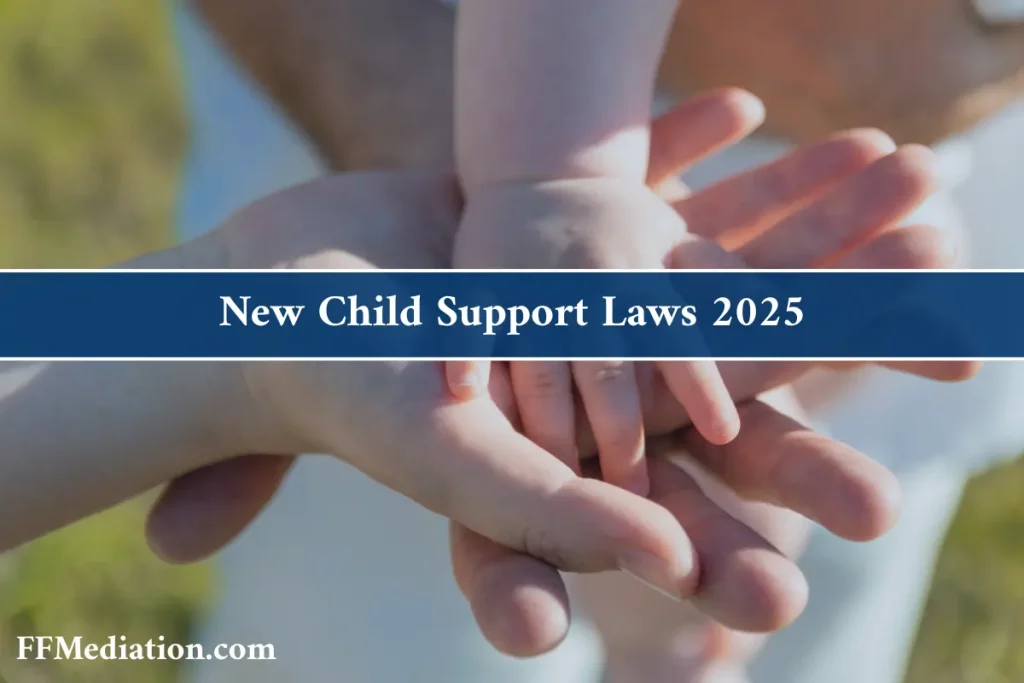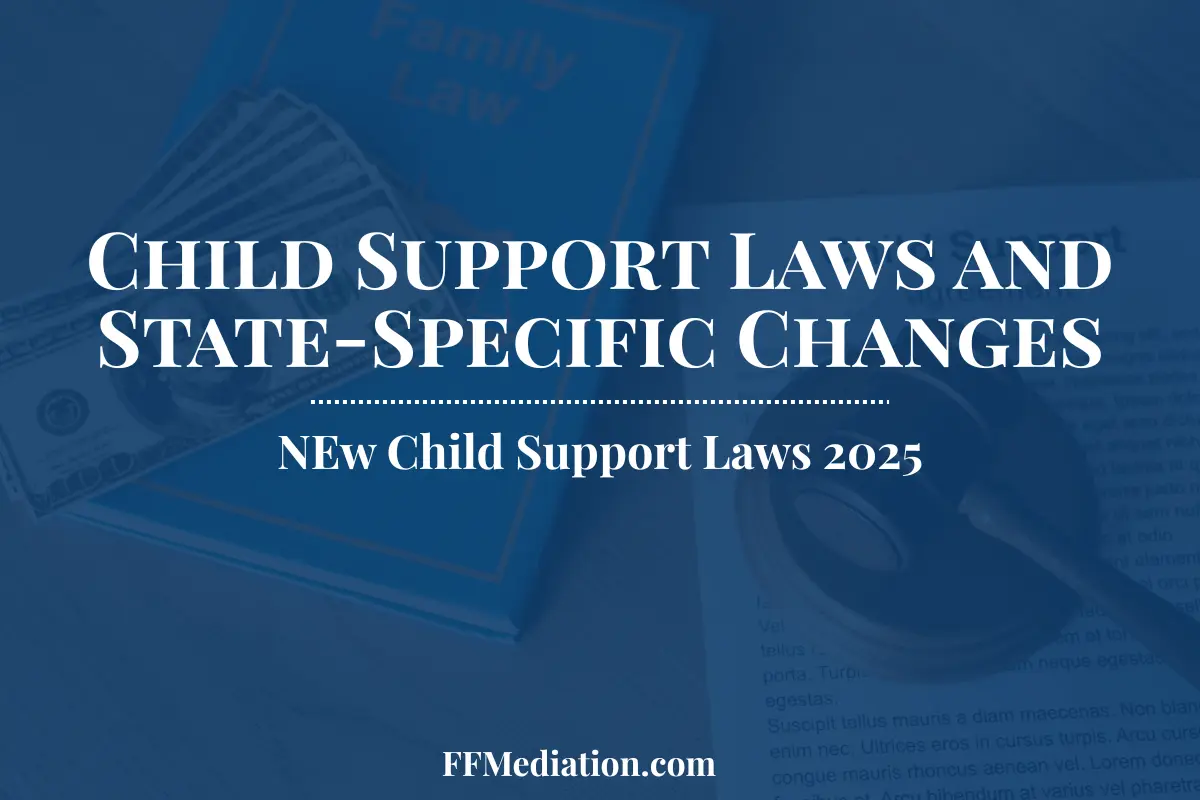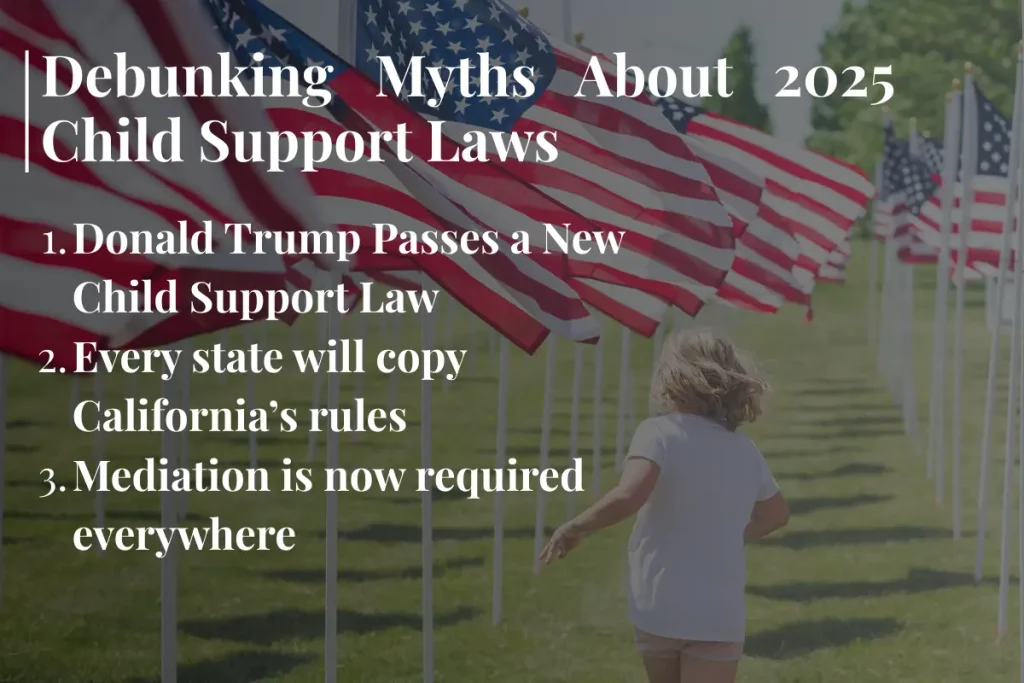Providing Divorce Mediation Services Throughout California
Providing Divorce Mediation Services Throughout California
Home » Divorce and Family law Blog » New Child Support Laws Guidelines [Update] 2025

Reach out to find the best solution for your divorce with trusted professionals.
Child support provides basic clothing, food and stability for children, and there are legal changes potentially impacting child support in 2025.
Some things will be an improvement (child support can begin during pregnancy), while other changes may have mixed opinions.
The only caveat is that the laws differ by state so making mistakes is costly, which is where a mediator comes in handy. A mediator can help parents overcome the confusion and negotiate fair terms for their family’s needs without a full-blown court battle.
If you’re navigating 2025 new child support law changes, or those implemented as a result of Senate Bill 343 (Child Support), child support mediation is the best solution to settle your support matters without paying pricey attorneys in busy courts.
Child support mediation with Dina, California’s top-rated child support mediator, can help you seek guidance and make sense of these changes in the best interest of your child. Book your free consultation today.
The federal government has some most important updates to child support laws this year – some are in effect now, and some will take effect over time.
Let’s talk about what’s changing and what it means for families.
To begin with, the Supporting America’s Children and Families Act (H.R.9076) is making the system work better for all parties.
It increases enforcement so that parents cannot simply walk away from payments with little consequence.
It helps low-income families retain more of the public support they receive, and it provides the right amount of flexibility for gig workers and others who do not have a stable income.
States have a couple of years to implement these changes but the goal is to make the system operate smoother and more fairly.
The Unborn Child Support Act is a pending legislation which allows pregnant women to receive child support for pregnancy-related expenses like medical visits and prescriptions for vitamins.
This is huge because it acknowledges a baby with financial responsibility before birth. But at the same time, it also raises some questions about the onset of parental responsibilities, and states are working through the implications of this bill before passing it into law.
In addition to these two major pieces of legislation, there are other potential things happening in Washington that will impact child support.
In this case, lawmakers are considering potential expansions of the child tax credit, which sometimes falls under the metaphorical umbrella of child support.
They are also talking about possible ways to improve tracking and enforcement of payments, but those talks seem to be just at the beginning.
So, what does that mean? Generally speaking, it seems the system is being modernized to meet the way families function and exist in the 21st century, but some things take a long time to actually change or become effective. So it is worth monitoring if you are paying or receiving child support.
Related: Child support mediation is the best way to resolve disagreements. Know why.
Federal laws determine the minimum that a state has to provide, but the state laws provide the real punch.

Since September 1 of 2024, after the implementation of Senate Bill 343, California have made efforts to make child support more equitable. These changes are meant to balance the financial responsibility of both parents fairly.
Here is a glimpse of child support regulations brought by Senate bill 343:
Changes for low-income families this year mean that more child support dollars will go directly into their pockets instead of being held by the state.
These changes will start to be enforced in July 2025. But before relocating, note that moving away with a child out of state without a custody agreement can cause lots of legal headaches.
Judges now have greater rights to adjust payments when the standard formula doesn’t apply.
For example, a construction worker laid off seasonally could be considered by the courts now. Many of these changes began implementation in January 2025.
All of these changes indicate a trend — states want child support to reflect the actual needs of children and their families, instead of relying on formulas only. Remember that your specific situation will depend on where you live and your actual order.
Are you thinking about how these changes relate to your situation? A local mediator will know the best way to implement these changes to benefit your family.
The 2025 updates impact us all differently, and here is how certain groups are affected:
More child support money will be sent directly to families instead of being retained by the state. This translates into more support for groceries, school supplies, bills, etc.
The issue is, many parents do not know they qualify for these changes, and in some states, it is still too difficult of a process for which to apply
If a parent becomes incarcerated, their child support payments will now be paused rather than accruing—it gives some relief to the parent as he or she tries to rebuild his or her life. Some worry it is unfair when the other parent still needs support.
The biggest winners? Pregnant moms can now get support sooner, including prenatal vitamins and doctor visits.
The stronger enforcement gives some comfort that there will be fewer missed payments; however, some custodial parents are disappointed at how slow the system is for handling late payments, even with the new rights in place.
Bottom line? The changes help, but they’re not perfect. Some families will still need legal help to get what they’re owed.
Are navigating child support modification in 2025? Consulting with California’s top rated mediator like Dina can help you make informed decisions outside the court. Book a FREE Child Support Consult today.
Continue to monitor the changes on the government site and our FamiliesFirstMediation Blog will be your best bet for California updates.
Any changes in income, employment status, or living arrangements? File to modify your order as quickly as possible using your state’s forms (each state has its own rules).
And if you attend mediation, the best way to win child custody is treat it like a job interview—gather paystubs, bills, and school schedules. The more organized you are, the easier mediation will go.
Need help understanding how child support changes apply to you and what you should do? Get personalized help by booking a FREE child support mediation consult.
Child support started as we know it now with the Child Support Enforcement Act of 1975 – this was essentially the first time the federal government stepped in to help ensure children received financial support from both parents.
The concept was primarily focused on recouping welfare payments back then.
Now, fast forward 50 years and a lot has changed. We have come nearly full cycle from pure enforcement, to truly working to stabilize family life, over the last 50 years.
The current changes are trying to implement much greater equity (e.g. suspending child support payments for parents that are imprisoned) as well as prevention (e.g. helping mothers stay healthy during pregnancy).
For context, when the 1975 law was enacted, there was no guidance on how to identify the amount to pay – it took about 20 years to develop. We are actually modifying a system that can hopefully become family centered.
The old rules often trapped families in outdated formulas—like calculating payments based on income from years ago. The 2025 updates finally adjust for today’s realities:
Biggest upgrade? The system now prevents crises instead of just reacting to them.
The 2025 updates are just the beginning. Lawmakers are already discussing bigger child tax credit expansions, which could directly lower support burdens for struggling parents.
Meanwhile, states are testing automated enforcement tools to catch late payments faster—without court battles.
But the real question? Whether these changes will reach families quickly, or get stuck in bureaucracy. (We’re rooting for the fast version.)
Let’s address three common myths out there:

Nope. There have not been any presidential policies which have changed how child support payments are computed. The myth seems to come from a misunderstanding of routine policy updates as complete political overhaul.
Nope. Texas and Florida routinely reject California reforms. While ideas may float around (e.g., prenatal parental support), each state has their own formulas, and timeframes.
Only a few states still actually require mediation for custody disputes (Oregon does); child support mediation is still voluntary in most cases – but judges are recommending that families mediate so that they can avoid having conflict in court.
So what’s the takeaway? Always check the official state site before believing something that has gone viral.
The new child support guidelines and laws require you to be aware of the changes – Senate Bill (S.230) proposing child support for pregnant mothers and Supporting America’s Children and Families Act– and seek the best possible solution in case of modification.
As mentioned in the article, California has introduced a lot of changes since September of 2024 after enacting Senate Bill 343. This will of course require child support modification either through court or non-court options. Let’s explore both one by one.
Asking the courts for child support modification can be a complex battle for parents. Whether you are facing significant financial changes or need the adjustment for other reasons, the process can quickly overwhelm you if not done correctly.
It’s not uncommon for parents who litigated their divorce to choose not to modify their child support later, even when they have a reason, given the divorce attorney’s fees and costs outweigh the benefit to modify child support.
Though courts offer enforceable modification, they are good for high complex cases involving abuse or complex intricacies.
You can modify child support in California through two non-court options like Local Child Support Agency or child support mediation.
The former can be a low or no cost option with fast processing and enforcement support but you would have less customized agreements given that these agencies follow state guidelines strictly.
Moreover, the modification through a local child support agency would mean the minimal control on the outcomes of support modification.
While the other option is child support mediation that ensures that a child gets the care they need without facing the stress of drawn-out legal battles. Mediation offers well enforceable, customized child support agreements to your family needs at minimal possible costs. Book a FREE child support mediation consultation with expert support mediators to explore your options.
The changes over this calendar and legislative year – from Congress’ recognition of pregnant moms, to changes at the state level for child support formula – clearly show one thing: a system that is beginning to reflect the needs of real families.
That being said, speaking with a divorce mediator is much better than just googling. They will be able to explain how these changes will affect your situation, without the legal jargon.
Modify your existing support orders in California without the assistance of local child support agencies in a fast and personalized way by mediating the child support with California’s expert child support mediator, Dina Haddad. Get a free child support consultation today.
Families First Mediation is a family law mediation firm in California with over 60 years of combined family law experience. Our expert female family law and child support mediators are committed to providing you with a healthy divorce and creative child support solutions outside the court without the pricey attorneys and stress.
Whether you are navigating new child support laws or guidelines, take advantage of our vast expertise and background in the field of family law from divorce, custody, child support and spousal support to child support modification and legal separation. Book a Free Child Support Modification Consult with us.
Child support payment is neither a tax deductible for the payor and nor taxable incomes for its recipients according to the current rules of IRS in the United States. It simply means that you cannot claim child support as tax-deductible and taxable income on your federal tax returns.
The new updates in 2025 for child support laws are as Under:
Child support agreements remain enforceable no matter which state you or your child movies to in the United States of America. For further information related to child support and moving out during divorce or moving out of state with child but no custody agreement, please click the provided links.
The unborn child support Senate Bill (S.230) was introduced by Senator Kevin Cramer on Jan 23, 2025. The bill is still (as of July 9, 2025) in the initial phase of legislative process and has not been enacted.